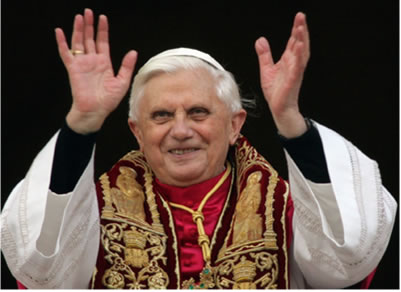ROUNDUP: Pope expresses "solidarity" with Jews on Holocaust
 Vatican City - Pope Benedict XVI on Wednesday, moving to quell outrage over a recently reinstated bishop's remarks denying the Nazi mass murder of the Jews, reiterated the Roman Catholic Church's "solidarity" with the Jewish people.
Vatican City - Pope Benedict XVI on Wednesday, moving to quell outrage over a recently reinstated bishop's remarks denying the Nazi mass murder of the Jews, reiterated the Roman Catholic Church's "solidarity" with the Jewish people.
Benedict during his weekly general audience said the memory of the Holocaust (or Shoah) cannot be cancelled through any form of denial.
The German-born pontiff also recalled his own past pilgrimages to the former Nazi death camp of Auschwitz whose January 27, 1945 liberation by Russian troops was widely commemorated on Tuesday.
"The images I collected during my numerous visits to Auschwitz bore witness to the innocent victims of a racial hatred," Benedict said of the site where the ovens used to cremate the bodies of those killed are still visible.
"Let its memory be a warning against oblivion, (Holocaust) denial and reductionism," Benedict said of Auschwitz which he last visited in May 2006 during his apostolic trip to Poland.
The pontiff's remarks came in the wake of mounting pressure on the Vatican to issue a robust response after one of four pardoned ultra- traditionalist bishops, British-born Richard Williamson, said he did not believe the Holocaust had taken place.
While not referring to Williamson directly, Benedict during the general audience also said he had asked the four bishops, whose 1988 excommunication he revoked last week, to adhere to the Church's Second Vatican Council teachings.
The clerics belong to the Society of Saint Pius X (SSPX), which broke with Rome over Church reforms introduced in the 1960s through the Second Vatican Council, including a declaration which prescribes brotherly relations with Jews.
And while on Tuesday the Vatican said the other three bishops had asked Benedict to forgive their colleague while distancing themselves from his remarks, many critics described the response as "unsatisfactory."
Benedict's words, on the other hand, were "necessary and welcome and contribute to clear many misunderstandings," over Holocaust- denial, Rome's Chief Rabbi Riccardo Di Segni said in his reaction Wednesday according to the ANSA news agency.
Di Segni was among many who strongly condemned the Vatican's announcement last Saturday - just days after Williamson's offending remarks were aired on Swedish television - that the four bishops had been accepted back into the mainstream church.
Fallout from the controversy has included Israel's Chief Rabbinate breaking off indefinitely official ties with the Vatican to protest the lifting of Williamson's excommunication, according to report Wednesday by the Jerusalem Post newspaper.
The Chief Rabbinate also cancelled a meeting scheduled for March 2-4 in Rome with the Holy See's Commission for Religious Relations with the Jews.
And Israel's Ambassador to the Holy See, Mordechai Lewy, in an interview published Wednesday in the Corriere della Sera newspaper, said clarity was needed on the issue from the Vatican's "highest levels."
However, papal spokesman Father Federico Lombardi said Benedict's general audience remarks "should be more than sufficient" in settling the issue of where the Pope and the Church stood on the issue of the Holocaust.
Meanwhile, the row's repercussions were also being felt in the German city of Regensburg, where Williamson made his Holocaust remarks to a Swedish interviewer and where SSPX has a training centre.
Regensburg's Catholic bishop said Wednesday that Williamson, who is based in Argentina, would not be allowed to set foot in his cathedral or any other church property.
German public prosecutors have opened an inquiry against Williamson over his remarks. Holocaust denial is a crime in Germany. (dpa)